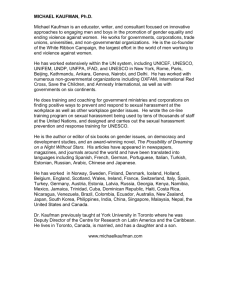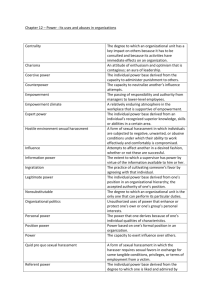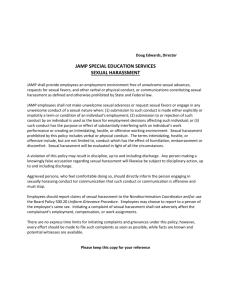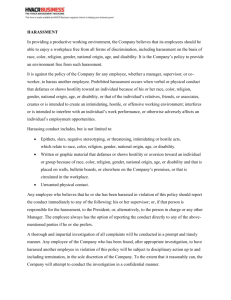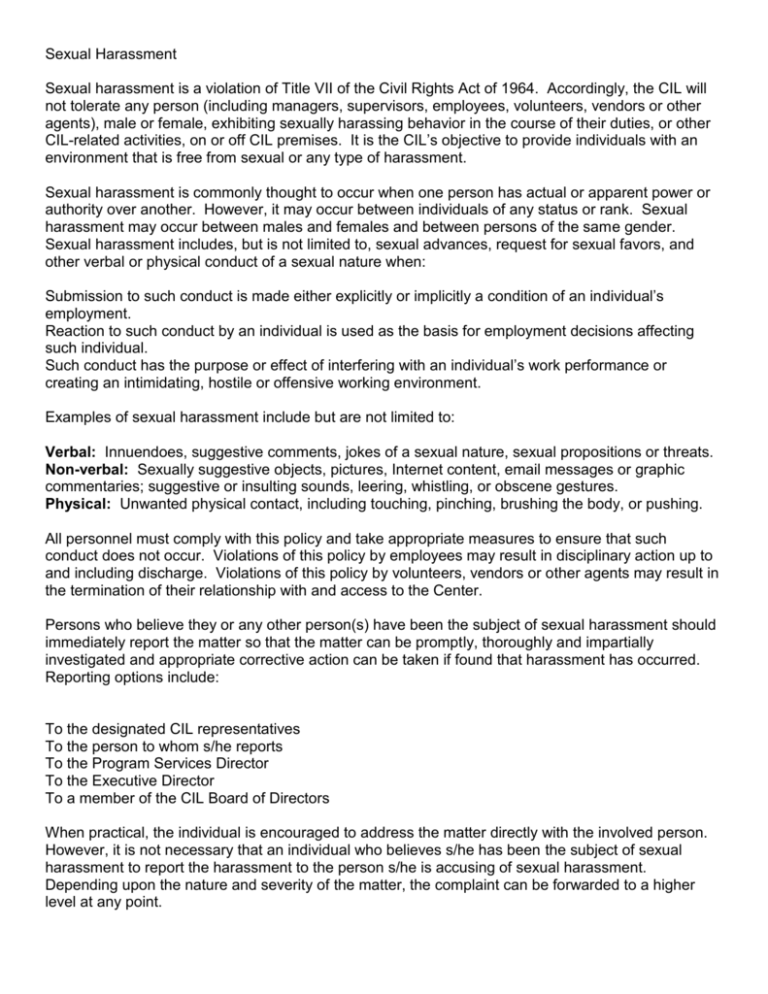
Sexual Harassment
Sexual harassment is a violation of Title VII of the Civil Rights Act of 1964. Accordingly, the CIL will
not tolerate any person (including managers, supervisors, employees, volunteers, vendors or other
agents), male or female, exhibiting sexually harassing behavior in the course of their duties, or other
CIL-related activities, on or off CIL premises. It is the CIL’s objective to provide individuals with an
environment that is free from sexual or any type of harassment.
Sexual harassment is commonly thought to occur when one person has actual or apparent power or
authority over another. However, it may occur between individuals of any status or rank. Sexual
harassment may occur between males and females and between persons of the same gender.
Sexual harassment includes, but is not limited to, sexual advances, request for sexual favors, and
other verbal or physical conduct of a sexual nature when:
Submission to such conduct is made either explicitly or implicitly a condition of an individual’s
employment.
Reaction to such conduct by an individual is used as the basis for employment decisions affecting
such individual.
Such conduct has the purpose or effect of interfering with an individual’s work performance or
creating an intimidating, hostile or offensive working environment.
Examples of sexual harassment include but are not limited to:
Verbal: Innuendoes, suggestive comments, jokes of a sexual nature, sexual propositions or threats.
Non-verbal: Sexually suggestive objects, pictures, Internet content, email messages or graphic
commentaries; suggestive or insulting sounds, leering, whistling, or obscene gestures.
Physical: Unwanted physical contact, including touching, pinching, brushing the body, or pushing.
All personnel must comply with this policy and take appropriate measures to ensure that such
conduct does not occur. Violations of this policy by employees may result in disciplinary action up to
and including discharge. Violations of this policy by volunteers, vendors or other agents may result in
the termination of their relationship with and access to the Center.
Persons who believe they or any other person(s) have been the subject of sexual harassment should
immediately report the matter so that the matter can be promptly, thoroughly and impartially
investigated and appropriate corrective action can be taken if found that harassment has occurred.
Reporting options include:
To the designated CIL representatives
To the person to whom s/he reports
To the Program Services Director
To the Executive Director
To a member of the CIL Board of Directors
When practical, the individual is encouraged to address the matter directly with the involved person.
However, it is not necessary that an individual who believes s/he has been the subject of sexual
harassment to report the harassment to the person s/he is accusing of sexual harassment.
Depending upon the nature and severity of the matter, the complaint can be forwarded to a higher
level at any point.
There will be no action taken against anyone who complains of sexual harassment unless such
accusation is shown to be intentionally false. The CIL will, to the maximum extent feasible, maintain
the confidentiality of such complaints. However, the investigation of such complaints will generally
require disclosure to various persons on a need-to-know basis.


